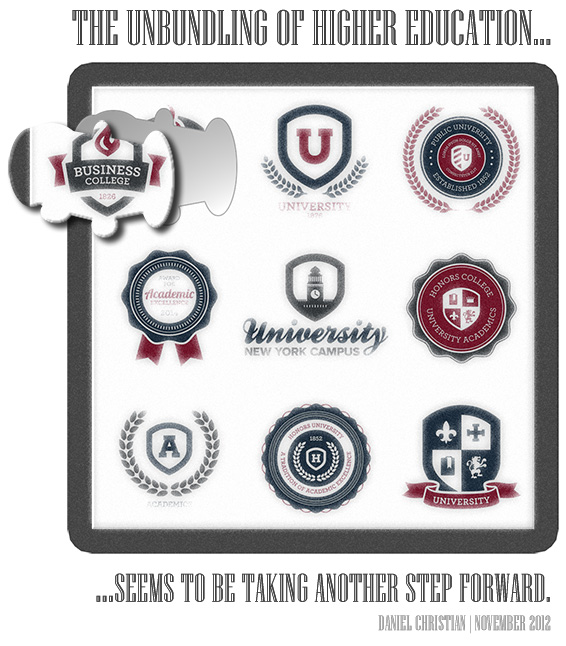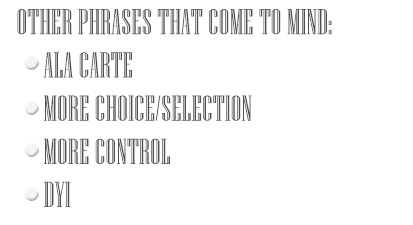
.

.
From DSC, some examples:
- Unbundling and Unmooring: Technology and the Higher Ed Tsunami — from educause.org by Audrey Watters
- Unbundling Higher Education | From the Bell Tower –– from lj.libraryjournal.com by Steven Bell
Excerpt (emphasis DSC):
Recent events in higher education suggest a new trend — earning degrees by the course from multiple providers. Are we looking at the iTunes model of unbundled higher ed? Call it alt-HE. - Napster, Udacity, and the Academy — from Clay Shirky
Excerpt:
Once you see this pattern—a new story rearranging people’s sense of the possible, with the incumbents the last to know—you see it everywhere. First, the people running the old system don’t notice the change. When they do, they assume it’s minor. Then that it’s a niche. Then a fad. And by the time they understand that the world has actually changed, they’ve squandered most of the time they had to adapt.
.
It’s been interesting watching this unfold in music, books, newspapers, TV, but nothing has ever been as interesting to me as watching it happen in my own backyard. Higher education is now being disrupted; our MP3 is the massive open online course (or MOOC), and our Napster is Udacity, the education startup.
…
But who faces that choice? Are we to imagine an 18 year old who can set aside $250K and 4 years, but who would have a hard time choosing between a residential college and a series of MOOCs? Elite high school students will not be abandoning elite colleges any time soon; the issue isn’t what education of “the very best sort” looks like, but what the whole system looks like.









I have published three articles on the unbundling of higher education (the first in 1975; most are available through an internet search): “The Unbundling of Higher Education,” 1975 Duke Law Journal 53. “The Dismantling of Higher Education,” published in two parts in 29 Improving College and… Read more University Teaching 55 (1981) and 29 Improving College and University Teaching 115 (1981) “The Restructuring of Legal Education Along Functional Lines,” 17 Journal of Contemporary Legal Issues 331 (2008)(discusses legal education, but applies to higher education generally); abstract below
THE RESTRUCTURING OF LEGAL EDUCATION, by William K.S. Wang
ABSTRACT
Currently, law schools tie together five quite distinct services in one package, offered to a limited number of students. These five functions are: (1) impartation of knowledge, (2)counseling/placement, (3) credentialing (awarding grades and degrees), (4) coercion, and (5) club membership. Students do not have the opportunity to pay for just the services they want, or to buy each of the five services from different providers.
This article proposes an “unbundled” system in which the five services presently performed by law schools would be rendered by many different kinds of organizations, each specializing in only one function or an aspect of one function. Unbundling of legal education along functional lines would substantially increase student options and dramatically increase competition and innovation by service providers. This offers the hope of making available more individualized and better instruction and giving students remarkable freedom of choice as to courses, schedules, work-pace, instructional media, place of residence, and site of learning. Most importantly, this improved education would be available on an “open admissions” basis at much lower cost to many more individuals throughout the nation, or even the world.
In order to explain how to restructure the existing law school system, this article will discuss the five educational services presently performed by law schools, the disadvantages of tying these services together, a hypothetical unbundled world of legal education, the advantages of the unbundled system, answers to some possible objections to the system, and some recent developments in the use of technology and distance learning in law schools.
The main theme of this article is the advantage of unbundling. A more modest sub-theme is the benefit of use of technology and distance learning.
Thank you very much Professor Wang for taking the time to provide this useful information!
Similar to what occurred with the unbundling of the CD/album…I think we’ll see much more ala carte education/degrees in the future as this unbundling process continues within higher education.
Thanks again Professor Wang,
Daniel
Also see a new post thanking you for your work on this topic:
http://danielschristian.com/learning-ecosystems/2013/05/29/thanks-professor-william-k-s-wang-for-your-work-re-predicting-the-unbundling-of-higher-education/